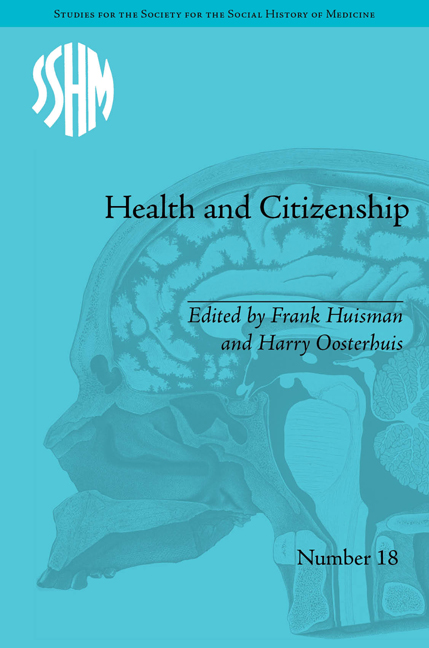Book contents
- Frontmatter
- CONTENTS
- Acknowledgements
- List of Contributors
- The Politics of Health and Citizenship: Historical and Contemporary Perspectives
- Part I Liberal Citizenship and Public Health
- Part II Social Citizenship: Health in the Welfare State
- Part III Neo-Republican Citizenship: Health in the Risk Society
- Notes
- Index
Part III - Neo-Republican Citizenship: Health in the Risk Society
- Frontmatter
- CONTENTS
- Acknowledgements
- List of Contributors
- The Politics of Health and Citizenship: Historical and Contemporary Perspectives
- Part I Liberal Citizenship and Public Health
- Part II Social Citizenship: Health in the Welfare State
- Part III Neo-Republican Citizenship: Health in the Risk Society
- Notes
- Index
Summary
The late twentieth century witnessed a revolution that affected the Western welfare state at its core. After a century of growing state intervention, it was increasingly felt that the state had become almost omnipresent, taking care of citizens from cradle to grave. Particularly after the Second World War, state intervention increased due to aging populations, the rise of chronic disease and improved technological possibilities. This led to spiralling costs, but also – critics argued – to dependent and calculating citizens as well. Therefore, the situation triggered two kinds of response: one economic, one moral. First, it was felt that the welfare system was no longer affordable in a competitive global economy. The neo-liberal revolution of the 1980s, initiated by British Prime Minister Margaret Thatcher and American President Ronald Reagan, and later copied by other Western European states, advocated that the state withdraw from the social domain. Collective arrangements were being reconsidered, reformed, abolished or ‘left to the market’. The second, moral response to the crisis of the welfare state felt that civic responsibility – necessary to sustain the welfare state – was crumbling; therefore, citizenship needed to be redefiend. It was argued that the emphasis should shift from collective solidarity (organized by the state) to individual responsibility (embodied by citizens), and from passive entitlement to active participation. Neo-republican citizen-ship entailed major shifts in the health care system.
- Type
- Chapter
- Information
- Health and CitizenshipPolitical Cultures of Health in Modern Europe, pp. 173 - 176Publisher: Pickering & ChattoFirst published in: 2014

